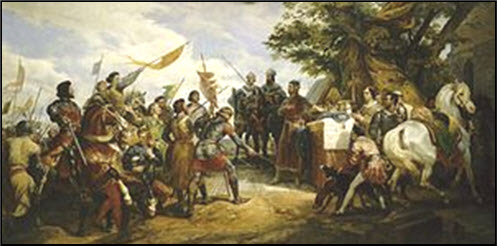


xxxxxThe Battle of Bouvines, fought in 1214 to curb the growing power of the French under Philip II, had quite the opposite effect. By gaining the victory, France emerged as the leading power in Europe, whilst Otto IV, the humiliated Holy Roman Emperor, went into retirement, and a defeated King John of England witnessed the loss of nearly all of his European possessions. It was perhaps hardly surprising that the English barons should demand some concessions from their monarch the following year (1215).
THE BATTLE OF BOUVINES 1214 (JO)
 xxxxxThe Battle of Bouvines was fought between a coalition of European forces led by the Holy Roman Emperor Otto IV, and the army of the French king, Philip II, a strong monarch often known as Philip Augustus. The allied force, which included a small English contingent under King John, aimed to curb the growing power of France, but it totally failed to do so. The conflict took place in Flanders, not far from Lille, in July 1214. It was a bloody affair with heavy casualties on both sides, but the French eventually gained a decisive victory, mainly due to the superiority of their cavalry. The illustration here shows Philip Augustus addressing his troops before the battle.
xxxxxThe Battle of Bouvines was fought between a coalition of European forces led by the Holy Roman Emperor Otto IV, and the army of the French king, Philip II, a strong monarch often known as Philip Augustus. The allied force, which included a small English contingent under King John, aimed to curb the growing power of France, but it totally failed to do so. The conflict took place in Flanders, not far from Lille, in July 1214. It was a bloody affair with heavy casualties on both sides, but the French eventually gained a decisive victory, mainly due to the superiority of their cavalry. The illustration here shows Philip Augustus addressing his troops before the battle.
xxxxxBouvines was an important victory for the French king, Philip II, and an ominous defeat for King John of England. France now became the leading power in Europe, having gained control of the whole of Flanders and northern France, whilst John, being obliged to renounce all claims to these regions and severely weakened by his defeat, was to prove no match for his rebellious barons. As we shall see, he was compelled to sign the Magna Carta the following year (1215). As for the Germans, a humiliated Otto retired to his estates the following year, and Frederick II took his place as king and emperor.
Acknowledgement
Bouvines: by the French painter Horace Vernet (1789-
JO-


